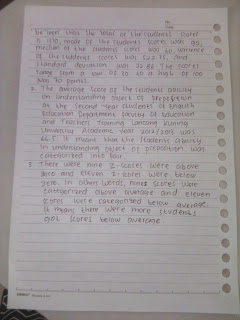SEMANTICS
Semantics is the study of meaning that is used to understand human expression through language.
Remember that language is arbitrary (one of the characteristics of languages).It is arbitrary because the relationship between forms and their meanings are sometimes cannot logically proved.
Although a form can have more than one meaning,there is always a primary or original meaning that is expresses.The original meaning of a form in a language is normally called "Denotation".
Example:
Rose="A garden plant with thoms on its stem and pleasant-smelling flowers or a flower from this plant.
Besides,there are additional meaning,which is known as "Connotation".
Example:
One may call a beautiful girl a "rose" or a "lily".
Under the subject of semantics,we shall deal with the concepts of:
1.Polysemy
Polysemy is the state or phenomenon in which the words that have more than one meaning.
The concrete form of polysemy is called "polyseme".
Example:simple (English is extremely plain subject)
with nothing added/not decorated in any way (This blouse is too plain)
2.Synonymy
Synonymy is the state or phenomenon in which the words that sound different but have the same or
identical meaning as another word or phrase.
The concrete form of synonymy is called "synonym".
Examples:
small = little
big = large
mother and father = parents
3.Antonymy
Antonymy is the state or phenomenon in which the words have the sense relation which involve the
opposite of meaning.
The concrete form of antonymy is called "antonym".
a.Implicitly Gradable Pairs (Graded Antonym) refers to the words related to the object they modify.
The words themselves do not provide an absolute scale.
Examples:
big >< small
good >< bad
b.Complementary pairs (complemetarity) refers to the existence of pairs that the denial of one,
implies the assertion of the other.
Examples:
male >< female
alive >< dead
c.Relational pairs (converseness) refers to the pair of words that display symmetry in their meaning.
Examples:
buy >< sell
push >< pull
4.Hyponymy
Hyponymy is the state or phenomenon that shows the relationship between more general term
(lexical representation) and the more specific instances of it.
The concrete forms of sets of word are called "hyponyms".
Example:
The lexical representation of:
red,yellow,green,blue,purple,black,is[+color]
thus,we can say that:"red" is a hyponym of "color" and so on.
5.Idiom
An idiom is a group of words in which the meaning cannot be explained in terms of the habitual
meanings of the words that make up the piece of language.
Idioms involve the non-literal use of language and they can be categorized as follows:
Examples:
1.Alliterative Comparisons
as good as gold (well behaved)
2.Noun Phrase
a red letter day (a day that will never be forgotten)
3.Prepositional Phrase
at sixes and sevens (unable/unwilling to agree)
4.Verb + Noun phrase
kick the bucket (die)
5.Verb + Preposition Phrase
be in clover (be exceptionally comfortable)
6.Verb + Adverb
put down (kill)
sumber:
sumber:
http://www.slideshare.net/Andriyanieka12/13-semantics-synonym-antonym-homonym-hyponym-polyseme-idioms-18509523

